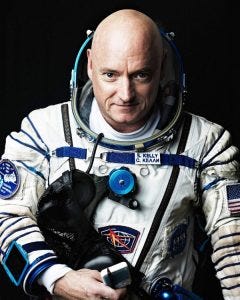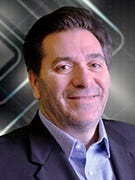Capt. Scott Kelly: Tips on Becoming a Fearless LeaderCapt. Scott Kelly: Tips on Becoming a Fearless Leader
The famed astronaut and Navy pilot discusses leadership and risk taking ahead of his CP Expo keynote.

Capt. Scott Kelly truly has the ultimate resume. You can’t imagine anyone topping what he has accomplished anytime soon — a record-setting amount of time spent in space, the single longest mission of an American astronaut and commander of the International Space Station, commander of space shuttles Discovery and Expedition. He also served in U.S. Navy as an aviator and test pilot, earning the rank of captain. It was in the Navy where he did what most pilots say is the most dangerous of flying tasks — landing a speeding fighter jet on the deck of an aircraft carrier bobbing in the ocean.
Kelly’s time spent in the military, as well as with NASA, have shaped an inspiring yet humble American leader. By his own admission he was an unmotivated student who confronted his shortcomings, launching an amazing life and career. He is undoubtedly one of the country’s most fearless leaders, putting to test man’s ability to spend extended periods in space and endure long periods of isolation from other humans.

Capt. Scott Kelly
Channel Futures had an opportunity to interview Capt. Kelly to discuss his views on leadership, being fearless, taking risks and other insight that will help channel leaders become better at what they do. He plans to share a life’s worth of lessons during his keynote at the next Channel Partners Conference & Expo and MSP Summit, May 1-4, at the Venetian Resort Las Vegas. We will run additional excerpts from our interview in the coming weeks. Since the theme of the May event is “Elevate: Your Time to Shine,” we thought Kelly would have the perfect message to complement the topic. If you are interested in seeing Capt. Kelly along with meeting peers and technology providers, register here today.
Channel Futures: During your record-breaking year in space, you had time to reflect on your leadership skills as well as your evolution as a leader. What did you learn that might help others who are established leaders or up-and-comers?
Capt. Scott Kelly: I’ve had a lot of leadership opportunities starting from when I was in high school as the captain of the swim team and as a fighter pilot, but it wasn’t until I got to NASA that I really had the opportunity to practice leadership in a much more serious way as commander of the space shuttle, then later on three different occasions on the international space station. But I never really gave leadership much thought. As I was doing it, it’s not something I thought about. How am I going to lead this group? How do I make decisions? It wasn’t until I left NASA that I really had the opportunity to reflect on it. Leadership, and how we operate and make decisions, is somewhat situationally dependent.
Sometimes you’re in space and there’s a fire. That’s the time for the commander to be the dictator. You know, you can’t run outside and call the fire department. You have to deal with the problem. You have to deal with it right now. And that’s the time for an authoritarian style of leader. But that’s very, very rare that that’s happened. As a matter of fact, in my experience, I never really had to do that in space, even though we did have a little fire at one point in a science experiment. As you can imagine, fire in space is bad.
You know, often I would recognize that some people I was flying with are more of an expert on something than I was, and I would defer to them. “Hey you, you decide. You tell us what to do, you make the decision. You’re the expert.” You know, sometimes we would vote on things.
Certainly, as the commander of the crew, I would get people’s opinions and try to make the right decision. Leadership, though, is about …
… knowing who your teammates are, recognizing what their skills are and being able to take advantage of the things that people are good at — and also helping them rise up and perform better in areas where they need some help. That is the big take homes from leadership.
And also knowing that you know as the leader you’re responsible for the whole team and taking it very, very seriously.
CF: There is no doubt that through your military and astronaut career you took on a great deal of risk. Every business leader today faces risk and must weigh that against the opportunity. What can you share about risk from your personal experiences?
CSK: In my business, the risk we take can sometimes end with you losing your life or the lives of your colleagues. You can certainly damage multimillion-dollar pieces of hardware, ruin someone’s science experiment if you do it improperly. So there is that kind of risk. Some of the risk would be similar to the risk you take as a fighter pilot or as a test pilot if you’re in law enforcement as an example. If you’re in the military, certainly there’s a risk to lives, but then there’s the other type of risk that has in some cases very serious consequences if you fail to manage that risk properly.
When you’re responsible for people’s money, as an example, putting it at risk can have some serious implications if you don’t do that kind of thing correctly. So I think they’re related, certainly. But what I found in my life and my career is that taking risk [is important], being willing to make mistakes and at times being willing to fail — hopefully not fail in a way that gets you killed. It’s kind of a different category like I said, but I think those kind of risk takers are often people that are very successful. You know, the people that are willing to stick their neck out and fail at something often are the ones that in the end have learned from their failures and come out on top.
I think it’s a big part of any business managing risk, seeing where the biggest vulnerabilities are in your business, or whatever you’re trying to accomplish, but not being afraid to take that risk for fear of failure. I don’t generally learn anything when I do something well, doing it right the first time. Sometimes that’s just an accident. You can do something right by accident and then you think you’re some kind of expert. It’s really for me, when I failed at things, that I actually learned what I am capable of achieving. It allowed me to set new goals.
In coming weeks, we will publish more insight from our interview and conversation with Capt. Kelly. We will share his thoughts on how to make transitions in roles and life easier than they could be, tips on handling anxiety, stress and uncertainty, along with his thoughts on how technology is impacting space travel. You can also read find ins book, “Endurance: My Year in Space, a Lifetime of Discovery.”
About the Author
You May Also Like


